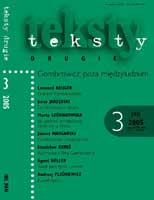Kosmos powtórzeń Witolda Gombrowicza
Witold Gombrowicz's Cosmos of Repetitions
Author(s): Anna Czabanowska-WróbelSubject(s): Literary Texts
Published by: Instytut Badań Literackich Polskiej Akademii Nauk
Keywords: WITOLD GOMBROWICZ; KIERKEGAARD; PHILOSOPHY; POLISH LITERATURE
Summary/Abstract: This essay intends to signal some most important examples of significant and meaningful repetitions in Gombrowicz’s works – from Ferdydurke through to Kosmos – whilst, secondly, it also seeks to give evidence to that the repetition-related tricks from various tiers of the individual literary pieces get linked with each other in a well-thought-out, purposeful manner. In its first part, the article discusses the role of repetition in Gombrowicz’s oeuvre, as Gombrowicz was aware of a philosophical meaning of the motif. He has himself pointed out to Ślub as a play where repetition is an important element. Actually, the same is true for his Operetka. In Dziennik (The Journal), one finds a remark on Kierkegaard’s repetition. Apart from the latter, for Gombrowicz, the most important philosophical contexts would include Nietzsche’s ‘eternal return’ and its philosophical consequences in Heidegger; Bergson’s concept of time; and, Freudian – or, in broader terms, psychoanalytical – approach of repetition as neurotic, compulsive behaviours where sexual drive and death drive find their expression. Repetition (re)appears amassed at any and all tiers of Gombrowicz’s works: from doubling the sounds and syllables, through to repeated words and phrases, ‘repetition’ as a fiction theme or, at last, a meta-literary theme. In the prose, repetitions are strictly connected with the issue of mimesis. Repetitions appear in their rhetorical function in Trans-Atlantyk, whereas Gombrowicz would several times use his ‘intensifying through repeating’ method in The Journal. The role of repetition is essential as part of the intrigue or plot in all his novels, its significance growing gradually. In its second section, the essay focuses on interpreting Kosmos from the standpoint of repetition as a category.
Journal: Teksty Drugie
- Issue Year: 2005
- Issue No: 3
- Page Range: 79-90
- Page Count: 12
- Language: Polish

